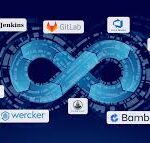
The evolution of DevOps continues to revolutionize how organizations build, deploy, and manage software. In 2024, emerging trends like GitOps, AI-driven CI/CD pipelines, and a growing focus on security (DevSecOps) are taking center stage. These innovations promise faster, more reliable processes while addressing modern challenges such as scalability and cybersecurity.
1. GitOps: Redefining Deployment Practices
GitOps has become a cornerstone of modern DevOps practices. It leverages Git as the single source of truth for managing infrastructure and application configurations. By using version-controlled repositories, teams ensure consistency and transparency in deployment processes.
Key Benefits of GitOps:
- Automation: Automated rollbacks and updates improve reliability.
- Audibility: Changes are tracked, enhancing accountability.
- Speed: Streamlined workflows enable rapid deployment.
Many organizations are adopting GitOps to manage Kubernetes clusters effectively, making it a standard for cloud-native applications.
2. AI-Driven CI/CD Pipelines

Artificial intelligence (AI) is transforming continuous integration and continuous deployment (CI/CD) pipelines. By analyzing vast amounts of data, AI helps predict errors, optimize resource allocation, and automate testing.
AI’s Role in CI/CD:
- Error Detection: AI-powered tools can identify potential issues before deployment.
- Resource Optimization: Smart scheduling reduces build times and resource wastage.
- Self-Healing Pipelines: AI detects failures and initiates fixes without manual intervention.
This trend is particularly beneficial for organizations managing large-scale projects with complex dependencies.
3. DevSecOps: Security at the Forefront

In 2024, DevOps teams are prioritizing security with the integration of DevSecOps practices. By embedding security protocols into the development pipeline, teams can identify and address vulnerabilities early.
Notable Features of DevSecOps:
- Shift-Left Security: Testing starts early in the development cycle.
- Real-Time Monitoring: Continuous threat detection ensures proactive responses.
- Compliance Automation: Tools like Snyk and Aqua automate compliance checks.
As cyber threats grow, DevSecOps is becoming essential for safeguarding sensitive data and infrastructure.
4. NoOps and Beyond
The concept of NoOps, where operations are entirely automated, is gaining traction. By leveraging serverless architectures and advanced automation tools, teams can focus more on development and less on managing infrastructure.
Key Drivers of NoOps:
- Serverless Computing: Platforms like AWS Lambda and Azure Functions reduce operational overhead.
- Event-Driven Workflows: Automation is triggered by specific application events.
NoOps isn’t about eliminating operations teams but optimizing processes to achieve maximum efficiency
5. Enhanced Collaboration with Remote-Ready Tools
As hybrid work environments persist, tools that support collaboration across distributed teams are crucial. Platforms like Slack, Jira, and GitHub are incorporating features to improve visibility and real-time communication.
Trends in Collaboration Tools:
- Integrated Dashboards: Single-pane-of-glass solutions for pipeline monitoring.
- Asynchronous Updates: Features to facilitate global teamwork.
Investing in such tools ensures that even remote teams maintain productivity and alignment with organizational goals
6. Democratization of DevOps: DevOps as a Service (DaaS)
DevOps as a Service (DaaS) is growing rapidly, offering smaller organizations access to advanced DevOps tools without the need for significant infrastructure investments.
Benefits of DaaS:
- Scalability: Easily adjust capabilities to meet project demands.
- Expert Guidance: Access to best practices and automation tools.
- Cost-Effectiveness: Reduce the overhead of building in-house DevOps solutions.
This model is making advanced DevOps practices accessible to organizations of all sizes
Future Outlook
The trends in DevOps for 2024 emphasize efficiency, security, and collaboration. From AI-driven CI/CD pipelines to the democratization of tools via DaaS, these innovations are setting the stage for faster, safer, and more scalable software development. By embracing these advancements, organizations can stay ahead in the rapidly evolving tech landscape.
Are you ready to adopt these game-changing trends in your DevOps workflows? Let me know how I can help further!



